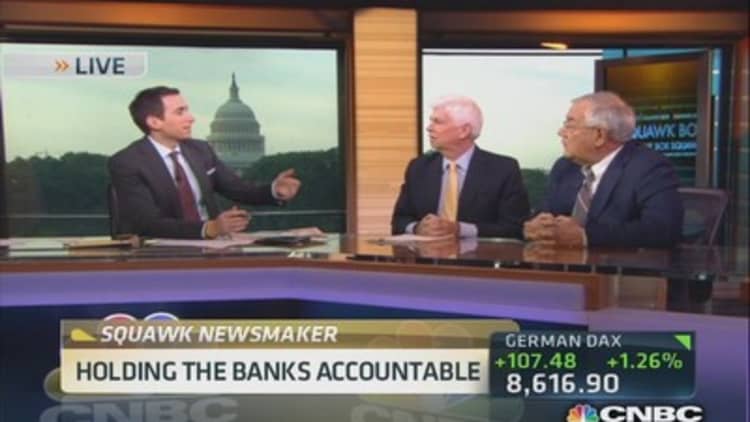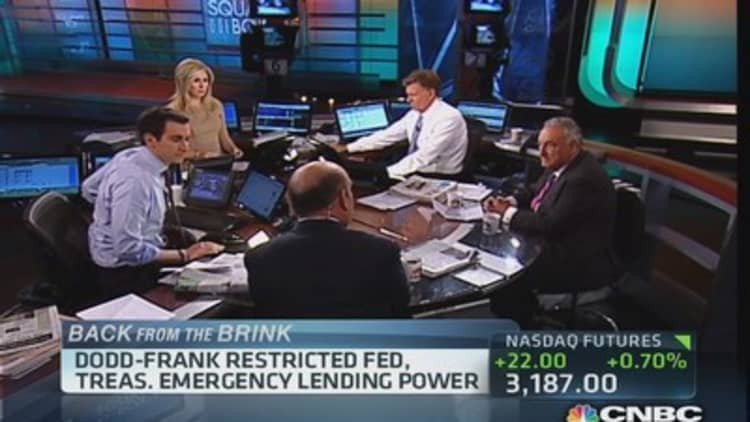To Wall Street, this town might seem like enemy territory. But even as federal regulators and prosecutors extract multi billion-dollar penalties from the nation's biggest banks, Wall Street can rely on at least one ally here: the House of Representatives.
The House is scheduled to vote on two bills this week that would undercut new financial regulations and hand Wall Street a victory. The legislation has garnered broad bipartisan support in the House, even after lawmakers learned that Citigroup lobbyists helped write one of the bills, which would exempt a wide array of derivatives trading from new regulation.
The bills are part of a broader campaign in the House, among Republicans and business-friendly Democrats, to roll back elements of the 2010 Dodd-Frank Act, the most comprehensive regulatory overhaul since the Depression. Of 10 recent bills that alter Dodd-Frank or other financial regulation, six have passed the House this year. This week, if the House approves Citigroup's legislation and another bill that would delay heightened standards for firms that offer investment advice to retirees, the tally would rise to eight.
More from The New York Times:
Bank's Midlevel Executive Becomes a New Face of the Housing Crisis
Fed Proposes a Rule to Help Big Banks Stay Liquid in Times of Crisis
AMoot Effort to Burnish the Reputation of Goldman Sachs
Both the Treasury Department and consumer groups have urged lawmakers to reject the bills, warning that they could leave the nation vulnerable again to excessive financial risk taking. The House proposals stand little chance of becoming law, having received a much chillier reception in the Senate and at the White House, which on Monday threatened to veto the bill on investment advice for retirees.
But simply voting on the bills generates benefits for both House lawmakers and Wall Street lobbyists, critics say. For lawmakers, it comes in the form of hundreds of thousands of dollars in campaign contributions. The banks, meanwhile, welcome the bills as a warning to regulatory agencies that they should tread carefully when drawing up new rules.
In other corners of the nation's capital, Wall Street has received a decidedly less cordial reception. The Justice Department recently struck a tentative $13 billion settlement with JPMorgan Chase over the bank's mortgage practices. Federal regulators are also increasingly demanding that JPMorgan and other financial firms admit to wrongdoing when settling enforcement actions.
(Read more: Don't blame the big banks, say Dodd-Frank authors)
"The House is the odd man out in terms of doing Wall Street's bidding," said Marcus Stanley, policy director of Americans for Financial Reform, a nonprofit group critical of the financial industry. "They're letting Wall Street write the law to its own benefit in ways that harm the public."
The lawmakers who support the bills say the legislation is good for the nation, not just the bank's bottom lines.
Still, in the case of the derivatives trading bill, Citigroup's lobbyists redrafted the proposal, striking out certain phrases and inserting others, according to documents reviewed by The New York Times. The House Financial Services Committee, a magnet for Wall Street campaign donations, adopted the bank's recommendations in 2012 and again this May.
(Read more: Financial crisis was a 100-year storm: Hank Paulson)
Wall Street's support from the House extends beyond favorable votes. When bank executives are called to testify before Congress, industry lobbyists distribute proposed questions to lawmakers and their staff, seeking to exert some control over the debate, according to emails written by staff members on the House Financial Services Committee that were reviewed by The Times.

One House aide, in an email exchange among House Financial Services staff members last year, warned that lawmakers should not mimic the talking points from lobbyists.
"I know that some of our members are inclined to whore, but we cannot be apes," the Republican aide said.
Wall Street is not the only industry that lobbies the House to shield it from tougher regulatory oversight. House Republicans have also come to the defense of energy companies, seeking to beat back rules for shale gas drillers and coal-powered electricity plants.
(Read more: Dislike of Wall Street hasn't faded with crisis)
But the recent financial legislation, critics say, illustrates how the House has become one of Wall Street's last strongholds in Washington.
The Wall Street-backed legislation has attracted broad support from lawmakers in both parties in the House, including prominent Democrats like Representative Carolyn Maloney of New York and Representative Jim Himes of Connecticut.
The lawmakers who support the derivatives trading bill say that it reins in a Dodd-Frank rule that could prove costly for Wall Street and Main Street businesses alike.
"New Dodd-Frank regulations that supposedly targeted Wall Street have the unintended consequence of limiting the options of farmers and manufacturers," said Representative Randy Hultgren, Republican of Illinois, who introduced the legislation.
(Read more: Next crisis would be a 'bad bellyache': AIG chief)
The legislation, Mr. Himes said in an interview, poses no financial risk to the country. And while he is the second-largest recipient among House Democrats of financial sector donations, that is not what is compelling his vote, he said.
"It hardly determines, thank goodness, how legislators think about these issues," said Mr. Himes, a former Goldman Sachs executive.
With the House scheduled to vote on the derivatives bill on Wednesday, the lobbying campaign has heated up once again.
(Read more: Kovacevich: Terrible TARP ruined banks)

A top Wall Street lobbying group, the Securities Industry and Financial Markets Association, recently sent Congressional aides a seven-page document advocating passage of the bill. The document, a copy of which was reviewed by The Times, argues that the bill will modify the derivatives trading rule that "has been opposed by senior prudential regulators" and "increase the cost to banks." The document goes on to cite public statements from Ben S. Bernanke, the chairman of the Federal Reserve, criticizing the rule.
But Mr. Bernanke has never endorsed the Citigroup-backed bill. And Sheila C. Bair, the former head of the Federal Deposit Insurance Corporation, who was also referred to in the document, said on Monday that "I do not support efforts to repeal" the rule.
Despite the lobbying, some of the committee's top Democrats are resisting the bills.
"After inflicting so much pain and suffering on the American people, now is not the time to let the largest banks back into the casino," Representative Maxine Waters, the ranking Democrat on the House Financial Services Committee, said in a statement.
The pro-Wall Street House bills are unlikely to gain much traction in the Senate. While some of the measures have companion bills supported by some Senate Democrats, those bills have little chance of passing the Senate so long as the Obama administration continues to oppose changes to Dodd-Frank.
(Read more: Dodd-Frank? More like Dud-Frank for lots of folks)
But it is possible that lawmakers will quietly tuck the provisions into a broader budget deal at the end of the year. And even if the Senate balks, the House bills can still send a powerful message to regulators drafting new rules under Dodd-Frank: slow down.
The bills, advocacy groups say, have a chilling effect on regulators, who have completed only about 40 percent of the rules required by the law.
Some House bills have the explicit purpose of delaying new regulation. One bill scheduled for a vote this week could temporarily restrain the Labor Department from imposing a new rule requiring some financial advisers to take on a fiduciary duty to clients when providing retirement investment advice. Such a duty would demand that the advisers act in the best interest of the client.
The bill that Citigroup helped draft takes aim at one of the more contentious provisions in Dodd Frank, a requirement that banks "push out" some derivatives trading into separate units that are not backed by the government's insurance fund. The goal was to isolate this risky trading and to prevent government bailouts.
(Read more: Big banks don't need to be split up: Sandy Weill)
A main culprit in the 2008 financial crisis, derivatives are contracts that allow companies to either speculate in the markets or protect against risk. Such contracts helped push the insurance giant American International Group to the brink of collapse in 2008.
The House bill scheduled for a vote Wednesday would significantly curb the requirement that banks separate their derivatives trading operations, a plan that was created as a compromise by Citigroup lobbyists. In essence, the compromise exempted a wider array of derivatives from the push-out rule. As it now reads, Citigroup's recommendations are reflected in more than 70 of the 85 lines of the House bill.
The lobbyists also outlined their arguments to lawmakers in a three-page briefing that sounded alarms about the push-out rule. The rule, Citigroup said, would ultimately impede "the safety and soundness of financial institutions."
(Read more: 5 years after Lehman, is your bank OK?)
In a past statement, a Citigroup spokeswoman noted that the bank "has been a strong supporter of financial reform, including Dodd-Frank." But when it comes to the push-out rule, she said, it is "widely agreed" that it "does absolutely nothing to create a safer financial system."
House aides, when asked why Democrats would vote for this proposal even though the Obama administration opposes it, offered a political explanation. Republicans have enough votes to pass it themselves, so vulnerable House Democrats might as well join them, and collect industry money for their campaigns.
"It is a free vote," one aide explained Monday.
—By Eric Lipton and Ben Protess of The New York Times.

